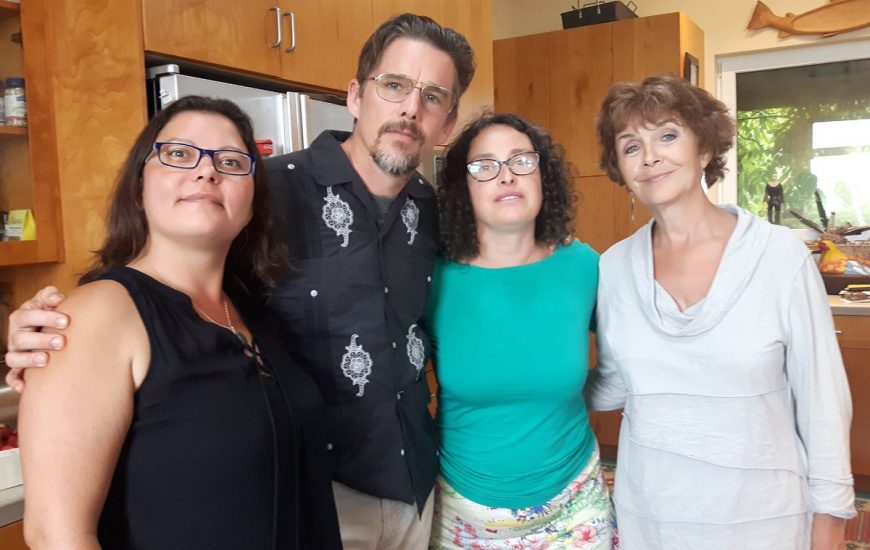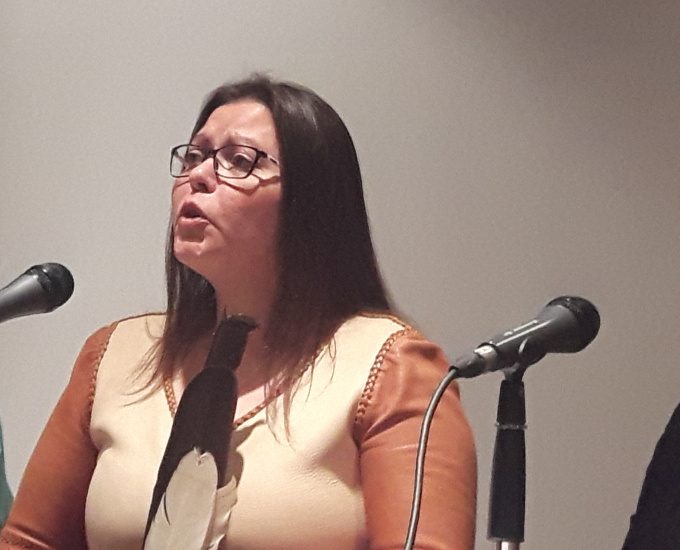
KJIPUKTUK (Halifax) – We have heard a lot about endangered right whales getting caught in fishing nets and dying around our shores, but that wasn’t the full story, says Mary Gorman of the Save our Seas and Shores coalition.
“Fishermen will tell you that whales and tuna used to be able to navigate in between nets when the fishermen were out. The whales would come right in, they were so smart. They could snatch those herring before those nets did.”
“Everyone thinks it’s ship strikes and fishing gear, and they are an issue, but they’re much less an issue if whales have their senses, if they haven’t been blasted into madness, basically.”
Gorman was one of the panellists at this morning’s press conference on the effect of airguns used for seismic testing on sea life in the Gulf of St. Lawrence and the Scotian Shelf.
The press conference was was called to launch of the vanishing call of the right whale, a powerful short documentary on the effect of seismic testing on whales who spend time in the Gulf. The documentary, by Eliza Knockwood, is narrated by actor and director Ethan Hawke, who summers on the shores of the Gulf.
The press conference occurred at the Art Gallery of Nova Scotia, in downtown Halifax.
Even 4000 kilometers away they are the loudest part of background noise
Seismic testing, the firing of arrays of air guns below sea level raise ocean background noise levels 1000-fold over areas the size of New Brunswick, said Linda Weilgart, an international expert on the devastating effects of seismic testing on ocean wildlife.
“Even 4000 kilometers away they are the loudest part of background noise,” Weilgart said.
I interviewed Weilgart in 2013, while working for the Halifax Media Co-op. That’s a long time ago, but sadly little has changed.
There are only about 411 North Atlantic right whales left on this planet. Thankfully seven new calves were born last winter after the population suffered devastating losses in the summer of 2017, said Gretchen Fitzgerald of the Sierra Club.
“Unfortunately these surviving mothers and calves are traveling north into waters the Canadian government has not adequately protected,” Fitzgerald said.
Fitzgerald, and others at the press conference, believe regulatory schemes place far too much control in the hands of pro-industry petroleum boards regarding where when and if offshore exploration and drilling will occur.
In the last year the Canadian government has even proposed to give more powers to these offshore boards under Bill C-69, in spite of opposition from coastal communities and the fishing communities, Fitzgerald said.
See also: Environmentalists rally while senators conduct Bill C-69 hearings in Halifax
“Such is the degree of lack of confidence in these offshore boards that the Offshore Alliance of which we are part has called for a a complete moratorium while there is a public review of how we regulate offshore oil and gas in this country,” said Fitzgerald.
Also at the press conference were John Davis, representing the Clean Ocean Action Committee, Susannah Randolph of the Florida chapter of the Sierra Club, and Eliza Knockwood, who made the documentary.
We are all related and there are no boundaries
What follows is a full transcription of Eliza Knockwood’s remarks at the press conference:
I want to begin by acknowledging my mother, who held me in her womb, my first home, surrounded by water, where I could hear the soothing sound of her heartbeat.That is our original place of existence before the water pushed us forward into this world to walk this earth that we call mother, mother earth.

The Earth that will provide everything that we need to survive. She has done a very amazing job raising each and every one of us, and she continues to sustain us.
I want to acknowledge that sea, the ocean, the clean running rivers that hold lives, the right whales, the beings, our salmon, all our swimmers, my relatives. They are my relatives.
I am a L’nu woman. This is my birthplace, Turtle Island is where I come from. And as an L’nu woman, I have been raised to understand my inherent responsibility, as a caretaker, as a protector of my mother earth, our earth, of our water, of the next generations unborn, my future grandchildren, my future great grandchildren.
Making the vanishing call of the right whale film was a hard endeavour. There were many tears shed in our time and getting this message forward.
To see the calf with her mother. Understanding the impacts of the seismic blasting and everything that has been shared with all of you today on this beautiful morning, from the panelists here.
I really hope that we can take this information and do something. Not just table it, not just shelf it, but to do something, to act on it because now you understand that we all are equally responsible for the health and the well-being of our planet, of our water, of our air, our atmosphere.
We are all related and there are no boundaries. That’s an illusion. It’s false.There is no border that divides me from my relatives in the United States. There is no border that divides me in the Gulf of st. Lawrence. We are all people of the Gulf and what happens to the Gulf happens to each and every one of us.
And so today I pray, and I ask our Creator our Great Spirit to open our hearts and our minds and our ears, and our ability to see the truth that is happening all around us, and that today when we return to our homes that we honour the water that flows from our taps, understand its origins and its importance, and understand that we are all equally entitled to be in a healthy state of mind and being, including our relatives the right whale.
I want to thank each and every one of you here and everyone that shares this earth that is advocating to protect what is sacred. So may we all unite in our efforts to protect the Gulf of st. Lawrence, and your own personal waters throughout the world.
And please share and sign the petition and continue to advocate for what is right. Wela’lin all of you. Thank you.
With a special thanks to our generous donors who make publication of the Nova Scotia Advocate possible.
Subscribe to the Nova Scotia Advocate weekly digest and never miss an article again. It’s free!



